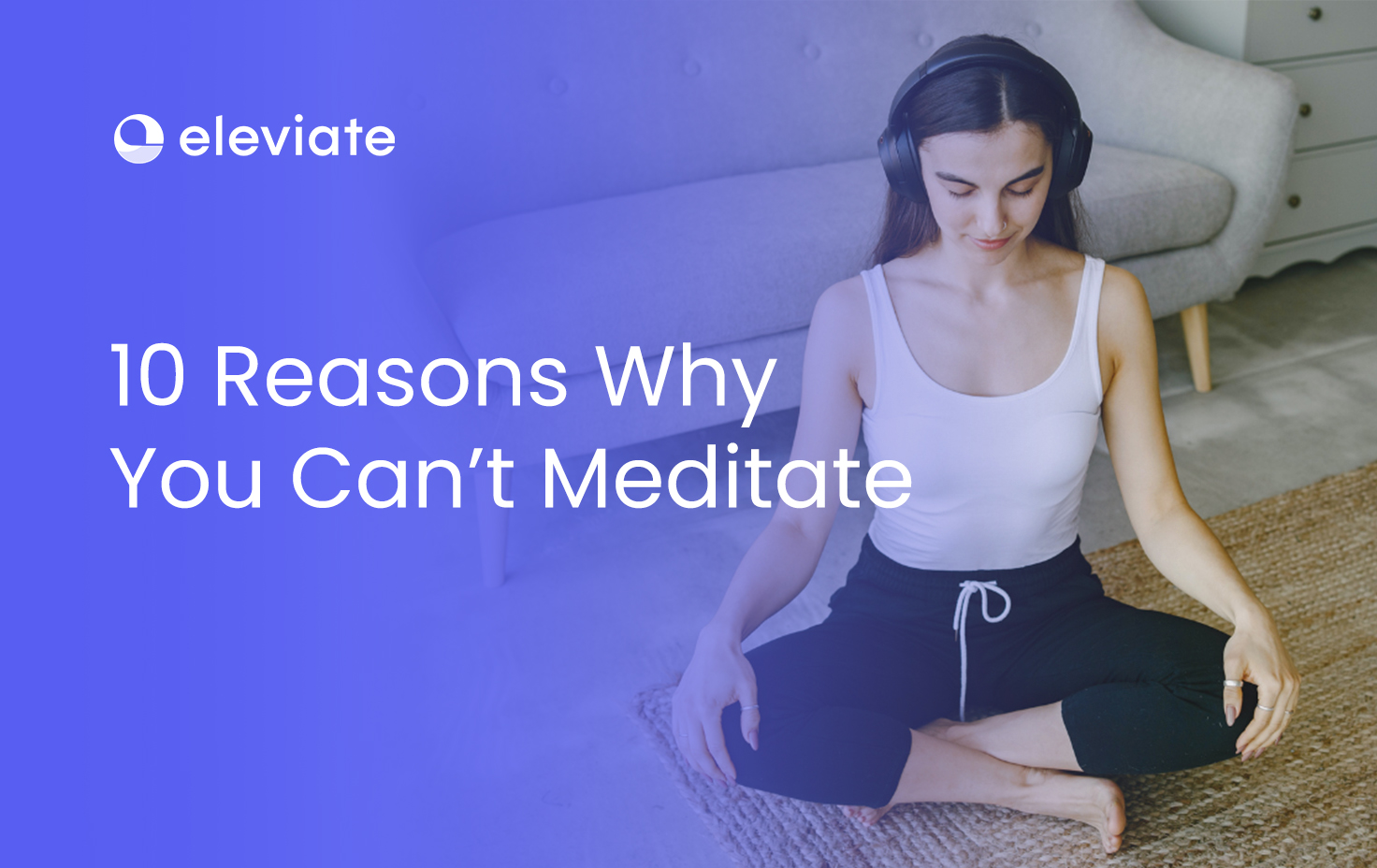Folks all over the globe find it comforting and helpful to practice meditation on a daily basis. So, the practice has become a universal trend. Yet, not all of us may seem to be able to introduce ourselves as prospects for this art. Many people ask themselves the same question: Why can't I meditate? The answer lies on the surface, where we choose to let it go unnoticed. The truth is that effective meditation is based on two primary aspects – physical and mental comfort. Today, we will rule out the main reasons you can't succeed with the practice, along with a list of effective ways of solving the issue before it roots down.
10 reasons why you can't meditate
You would be surprised at how a wide spectrum of obstacles can stand between you and effective meditation practice. We've rounded them up into 10 primary reasons why you can't relax and succeed with mindfulness meditation. They are the following:
Tiredness or hunger
Laziness
Lengthy practice
TV-distraction
Thought block
Improper meditation
Multitasking
Impatience
Cure obsession
Self-anger
Now, let's discuss these anti-meditation causes in detail.
1. You're tired or hungry
In case you still don't know, a successful meditation session is all about you keeping your focus on the practice. However, despite the power of will, it is challenging to concentrate when your lids are sliding shut or your stomach is rumbling so loudly that the neighbors a few blocks away can hear it.
This is a perfect example of the physical obstacles that new meditators may face. In situations like this, you should slightly give in to your body. Some of us may find it a hard time introducing ourselves to a prospect of complete alertness. If that is the case, you should go outside, get a nice, refreshing breath, and go back to the routine. Should you feel hungry – a healthy and light snack won't compromise your results.
2. You are a little lazy
There may seem to be nothing wrong with killing two birds with one stone. Let's say you can meditate while spending a few extra minutes in bed. What can go wrong? Well, too many things. But we are not here to judge – everyone is reluctant to get out of their cozy beds in the morning.
Yet, one of the most common mistakes you are eager to let slip would be that balancing on the edge of mindful relaxation and sound sleep isn't a simple task. To avoid the temptation and succeed with the goal, you can try sitting up in your bed or next to it so that you don't drift away in the middle of your mindfulness practice.
3. You aim at long practice sessions
Avid meditators can spend hours meditating. Some have personal accounts dedicated to showing that off. With that in mind, you may decide to follow a guru's example and set off for a long practice interval. However, if most people can't stick to the routine, especially from the beginning, they automatically decide that meditation isn't for them.
If you can't stay focused for too long, the best thing to do is set up your practice interval. If you feel comfortable practicing for about 5 minutes – go for it. As time passes, you can increase the intervals and progress. All it takes is a little bit of patience and dedication.
4. The TV stresses you
Another common cause that may make you feel like you are unfit for meditation is practicing in front of the TV. The endless stream of commercials, people in front of the TV, or the mere presence of the device will have your mind wandering, whether you are conscious of it or not. Some people feel the least stressed and distracted by the TV or any related electronic device when they space themselves out from those. It is good meditation practice to keep the attention focused inside of you rather than scattered all over the external world.
5. You're blocking your thoughts
After you read the headline, it hits you that such an assumption is as close to blasphemy as possible, since all the Buddhist mindfulness teachers tell you to stop thinking when you meditate. However, that is one of the most common misconceptions a significant number of new meditators have. The most important thing about the practice is not to block your thoughts but to observe them without being distracted. Your thoughts may come and go, like regular buses at the station, but you don't get on either. When you don't get caught up in the moment, you will proceed on the self-discovery journey without being interrupted.
6. You're not doing it right
Well, one of the most widespread obstacles on your road to utter mindfulness is assuming that you are not doing it right constantly. It is downright scary to constantly reflect on whether you followed the instructions precisely or not. However, for your mindfulness practice to flourish, you should realize that there is no one-size-fits-all ideal routine to stick to. It takes time to discover what makes your process tick. Yet, as long as you are not trying to copy some famous practitioners to the point of what they are wearing and how and where they are sitting, you will achieve mindfulness on your own terms with great personal benefits.
7. You are multitasking
Worry not—you are not alone. All the new meditators have to struggle with the urge to multitask. Moreover, you may not even realize that you are doing so. Has it ever occurred to you to try meditating during an evening run? Or maybe you have considered cleaning the house or doing other chores while you meditate? Well, a successful mindfulness practice requires your full attention. You will have a hard time continuing to concentrate while you are scrubbing those dishes or vacuuming the living room. You should begin meditating in complete silence. Just assume a comfortable position and enjoy the flow.
8. You give up fast
The moment the question "Why can't I meditate?" enters your mind, the seed of doubt starts to grow. You can wish for instant results, but considering a plethora of benefits that meditation can bring into your life, you can't fast-forward and master them in a single sitting. Think about lowered stress levels, better sleep, decreased blood pressure, and whatnot—you can achieve that through meditation only if you don't have high expectations and are ready to practice and grow. Thus, giving up isn't an option here.
9. You are looking for a cure
Despite the numerous benefits of meditation practice, it is not a magical cure to help you find a solution and fix any present issue. You shouldn't treat your daily meditation session as an instant fixer. Surely, regular meditation will help you reduce stress, achieve lifetime goals, and bring more happiness into your daily life. Yet, the more you think and count on the result, the more disappointed you will be since the practice does not work from a short-term perspective. It is a mindset and a lifestyle synced together.
10. You are angry with yourself
You will have a hard time continuing with meditation if you get easily frustrated. No one is born with the perfect skill to achieve the bliss of mindfulness without practicing. It happens so that you may skip meditation, can't get hold of your racing thoughts, or feel too tired to carry on with the process. Rather than trying to push it further and proceed with the routine, you should accept the current state of affairs and pick up where you've left off tomorrow. If you start getting angry with yourself, you will sooner or later start blaming the practice for all the mishaps, which won't lead to a positive outcome.

10 to-dos when you can’t mediate
We have presented a fair share of potential answers to the popular question – "Why can't I meditate?". Yet, it is not enough to be able to spot the issue or pattern that does not allow your mindfulness practice to flourish. You need to know how to get rid of those blocks and obstacles. There are a few practical ways you may want to consider:
Keep a worry diary
Try yoga
Make a soothing drink
Practice proper breathing
Start counting
Pat your pet
Go for a walk
Bring the pencils out
Use a third-party guide
Practice gratitude
Create an accessible guide to your worries
Based on the mentioned list of reasons why many people can't succeed with meditation, you can create your own diary of what puts you off. Keep in mind that every entry may be different. Yet, each time you sit down and ask yourself, "Why can't I meditate today?" and write down the primary obstacles that pop into your mind, you will feel immediate relief. Clearing your head before practice is a perfect way to concentrate on essential matters rather than potential distractions.
Yoga is an invaluable part of the routine
Jumping headfirst into the pool of various meditations may be downright scary, and you shouldn't do it against your will. What most beginners forget is that yoga is a great way to relax too. Sitting with your legs crossed can help you put your thoughts and feelings in perfect order. Take a few breaths, and you will be amazed at how the mood shifts. Start meditating as soon as you are ready. You don't need an hour-long session to achieve the desired goal.
Make yourself a soothing drink
For many decades, Buddhist mindfulness teachers have been preaching how to let go of daily anxiety and re-occurring life problems. However, it is easier said than done. When you feel like you can't relax, no matter what, try sipping on some calming beverages. Chamomile tea is perfect for when you face issues with falling asleep, but it comes in handy when you can calm your mind, too, and so does a cup of fresh turmeric latte.
Implement correct breathing practice in the routine
You'd be surprised at how often the simplest practices bring the best results. Well-tuned breathwork is a meditation technique designed to regain inner peace. You can find a variety of breathing exercises that will help you regulate your nerves, improve your focus and center your attention in the proper direction.
Close your eyes and do some counting
Many people find it challenging to relax. With all the difficulties life has to offer – it's no wonder. However, after you start meditating, things clear out a lot. If you can't concentrate for some reason, close your eyes, take a deep breath, and count. Inhale on one and exhale on two. Keep on until you feel as sharp as needed. You can repeat the practice whenever you feel that the focus shifts.
Relieve the tension by playing with your pet
Everything that surrounds you is an invaluable part of your road to mindfulness. While a significant number of things may distract you from meditation, other things can help you concentrate better than before. The joy that your pets bring into your life is hard to put into words, yet not everyone knows that they come to your aid when you can't keep meditating. All it takes is to pet your cat or dog for a few minutes without thinking about anything in particular, and you will regain your inner peace in no time.
Take a stroll in the neighborhood
The moment you feel like you can't meditate, you may want to postpone the practice and get involved in something else. However, it is good meditation practice to take a short walk and get back to your meditating process right where you left off. The walk can be as long as you need or as your free time allows, but even a few minutes outside, enjoying the fresh air, will motivate and re-program you, so there will be no room for anxiety or misfocus.
Draw in a coloring book for grown-ups
It is completely normal to use things considered reserved for kids on your way to effective meditation. It's been almost a decade since adult coloring books were introduced to the masses. That is why you should try and get one if you struggle with your meditation routines. The present researchers prove that coloring a complicated pattern, let's say a mandala, will put your mind in the right spot so that you can proceed with the practice and enjoy the results.
Present a guided meditation in your daily life
You may feel uncomfortable with practicing meditation on your own since you are unsure if you are moving in the right direction. That is what guided meditation is for. A wide spectrum of audio and video options features guidance available online. Consider these practical ways and affordable guides as your personal trainers to achieve mindfulness. The variety of options is pretty impressive, so you can pick the most suitable one and let the practice absorb you entirely.
Start with a "thank you"
Many people vaguely realize how precious the present moment is. Neither the past nor the future can compare. That is why it is a good thing to do to express some gratitude for anything that comes to mind. Sometimes you may not be fully aware of what you are thankful for and to whom the gratitude is sent. However, if you start the routine with a mere "thank you" and truly feel what the words are meant to mean, you will build a more intimate relationship with yourself. If you feel uncomfortable saying it aloud, you can say it silently. The profound connotation behind the phrase is all that matters.
How does Eleviate help you solve mental and physical issues?
Constant pressure, missing focus, limited self-awareness, and negative emotions topped with physical discomfort are known to make people all over the globe feel dissatisfied and miserable. At the present moment, different sources offer help in one sphere while leaving out the other. The Eleviate app was created to assist you with keeping your mental and physical health rates up. We can help you with effective pain management practices through meditation and physical exercise. Eleviate is aimed at helping you establish a more intimate relationship with yourself. Every function encoded in the app features guidance that brings visible results instead of vague expectations. All personal accounts are treated with an individual approach to get an accessible guide tuned in to your current situation and needs. If you have reluctantly stopped meditating, it is high time you get back on track together with Eleviate!





